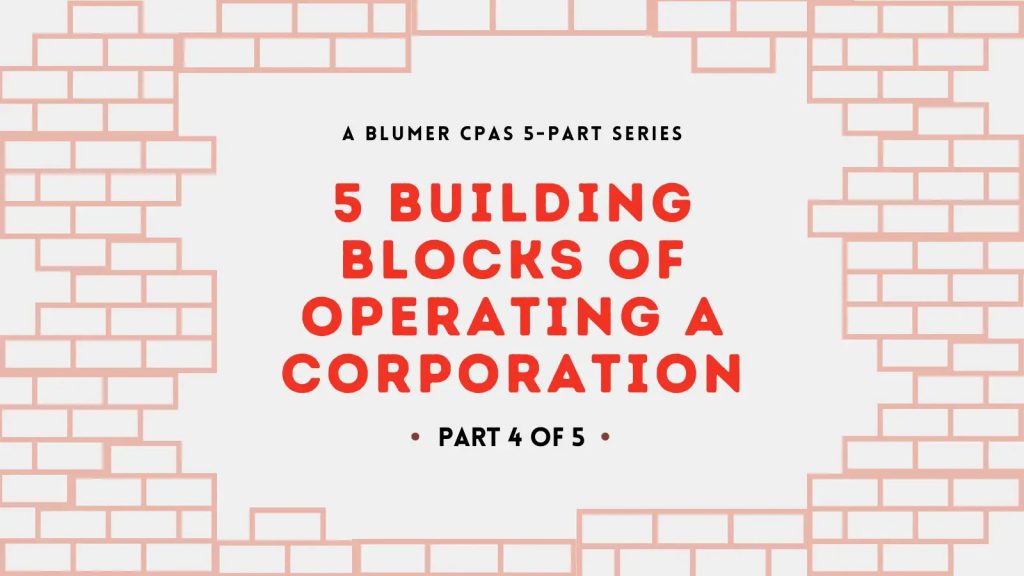5 Building Blocks of Operating a Corporation: Part 4

5 Building Blocks, Video 4 from Blumer CPAs on Vimeo.
Transcript:
Hey, hey, Jason Blumer here with Blumer CPAs. We’re in a series, I hope you’ve been watching, on the 5 Building Blocks of Operating a Corporation.
It’s important when you go from an LLC or a sole proprietorship and you structure up into a corporation that you do that right. We’re going over a deck that we actually use with our clients to help teach them, and I wanted to make a series to teach you, too. We talked about this at a high level last time, these five building blocks. We’re going to go into more detail here now.
There’s a couple ways to become a corporation; and that’s our goal, to become an S corporation. For short, we call it S corp; and that S just stands for the subchapter S code in the IRS tax code that allows us and affords us these rights to move you into an S corporation and help you save money.
There’s a couple ways to do that. Sometimes an LLC elects S corp status with the IRS. That’s really not creating a corporation. It’s just leaving you as an LLC. But it’s saying to the IRS, “Hey, can I be taxed as an S corporation?” That’s all you’re asking. You’re asking for permission. Another way is to actually create a corporation in your state of domicile with an attorney.
Once you do that, the next two blocks are very related, distributions and payroll. Now there’s strategy, once you’re an S corp, there’s strategy to pull cash out of your corporation in a more tax-advantaged way, and your firm will help you do that. What you used to call draws are now distributions, and that’s where we’re going to be protecting a lot of your cash that you’re pulling out. It’s not going to be pulled out with self-employment or payroll tax attached to it anymore.
Now, the IRS knows that, so what they require for an S corp owner is that you pay yourself a reasonable wage. That’s a phrase the IRS uses. They don’t define it, so your firm will define that for you. We go through an extensive assessment, a reasonable comp assessment for the owners of our S corp agencies that we help, to help them know what is a reasonable wage. Then we can define and protect as much money in tax as we can.
Now, taxes then as an S corp, you still will pay payroll taxes, but your distributions won’t have payroll tax applied to it. Now, but when you’re pulling money out of your profit, basically what you’re doing is you’re pulling your profit out. That’s still taxable money, but it’s not self-employed tax any longer the way it was as a sole proprietor or when you were taxed as an LLC before you were an S corp. Distributions, or what we used to call draws, had self-employment tax applied to it. But in an S corporation, pulling profit, distributions out in profit, you get to avoid and bypass that self-employment tax. Now, it takes some planning to do, but what you’re still doing is paying regular tax. There is a regular tax. That’s the income tax everybody pays on their 1040 return every year. Everybody pays regular tax. You’re still going to pay regular tax on your profit, you’re just not paying self-employment tax, which is the way we can save you the most money.
Then in the structure, if you have a partner, even if you don’t have a partner in an S corp, you don’t get to do whatever you want. So you’ve structured up into a corporation; and when you do that, you now do not get to do anything you want. You need us to help you. What we do is we apply structure to our clients to help them know what they can and cannot do, how they pull cash out, how they cannot pull cash out. Because you have to remember as the owner of the corporation, anytime you pull money out of that business bank account and put it in your personal bank account, that’s crossed that corporate line and it’s going to create a taxable event. We got to help you do that in the most tax advantaged way.
And hey, that’s what we do. So just email us info@blumercpas if we can help you do that, or if you think you’re not pulling the best tax advantage out of your companies. That’s what we do. We’ve been doing it for a freaking long time. So let us know. Take care. See you.
Recent Comments